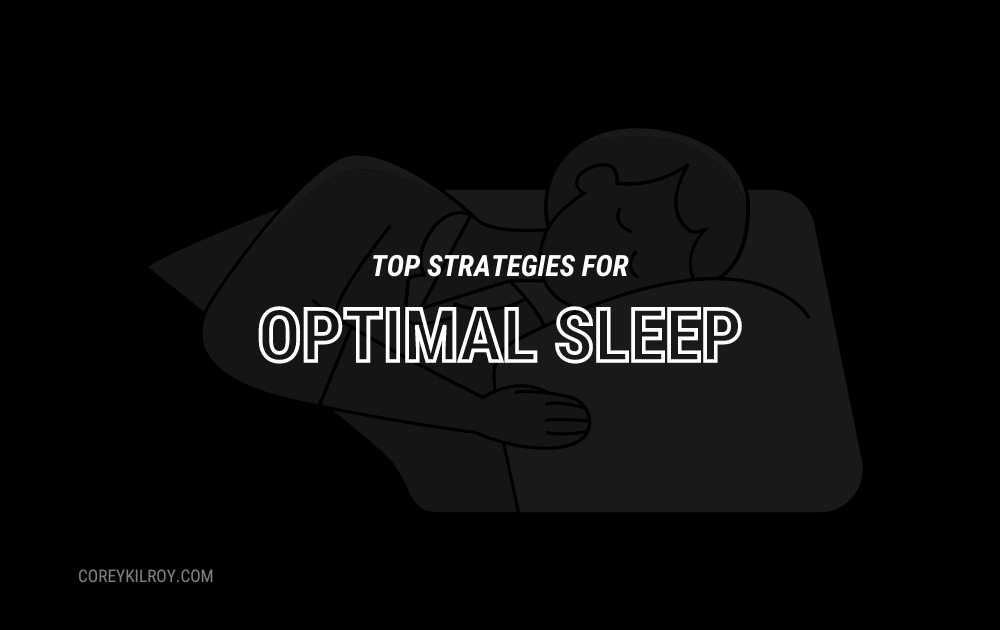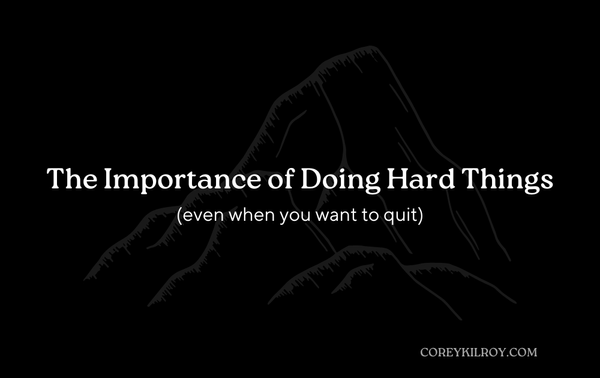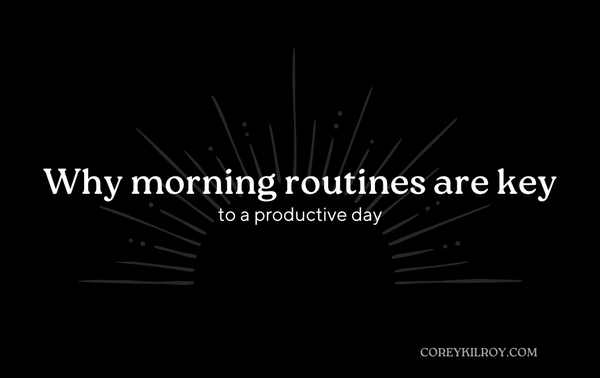Top Strategies For Optimizing Your Sleep

You can eat healthy and work out until your heart’s content, but none of it matters unless your sleep is in check.
Recovery is the most important factor when it comes to training and fitness.
Our bodies and fitness improve by encountering stressors, recovering, and adapting to a new baseline of fitness.
I go over this principle in my essay about the General Adaptation Syndrome (GAS) Principle.
However, if we neglect sleep and recovery, our bodies cannot properly adapt to the new stressors we’ve been introducing them to.
You may be coming from a different perspective and wish to get more sleep, but simply cannot fall or stay asleep.
This is a whole different problem in itself.
To add salt to the wound, there are even greater issues to worry about when it comes to the lack of sleep, other than fitness.
Poor sleep can lead to:
1. Increased risk of chronic health conditions such as obesity, diabetes, and cardiovascular disease
2. Impaired cognitive function, memory, and decision-making abilities
3. Mood disturbances, irritability, and increased stress levels
4. Reduced immune function and susceptibility to illness
I’ve personally experienced this.
I’ve gone through a week of poor sleep and 5-6 hour nights. These 5-6 hours of sleep compound over time to a whole lot of fatigue and overtiredness.
My training suffered, my sociability at work suffered, and my mental fog increased… safe to say it wasn’t fun.
Here are a few things you can try to get better at sleeping. Most of this list stems from Master Andrew Huberman’s sleep toolkit so check him out here if you wish.
Let’s get sleeping:
1. Wake up at the same time each day and go to sleep when you first start to feel sleepy.
Pushing through your tiredness and going to sleep late is one reason people often wake up at 3 am and can’t fall back asleep.
I catch myself doing this all the time.
You find yourself busy running around all day either at work or running errands, so you try to “buy back” your free time by staying up too late.
This is a bad mentality and will bite you in the a** in the long run.
It all circles back to our circadian rhythm - which I covered in my Everything You Need To Know About Circadian Rhythm essay.
2. Avoid viewing bright lights in the evening
Especially bright overhead lights between 10 pm and 4 am.
Here’s a simple rule: only use as much artificial lighting as necessary for you to remain and move about safely at night.
Because of our Circadian Rhythm, our bodies naturally start to produce melatonin and start to wind down for the day when it gets darker out.
If we override this and use artificial lighting around the house or from our phone screens, we risk disrupting this rhythm.
Candlelight and moonlight are fine, but viewing bright lights of all colors is a problem for our internal clocks.
Additionally, staying up on our phones at night shoots blue light directly into our eyes, ultimately disrupting our rhythm even further.
3. Avoid caffeine within 8-10 hours of bedtime
Some experts, like Dr. Matt Walker (sleep expert from UC Berkeley), may even say to push it 12-14 hours before bedtime.
This is because caffeine tends to have a half-life, meaning it stays in your system for hours after you’ve consumed it.
One study examining the sleep effects of 400 mg caffeine administered 30 minutes before bedtime demonstrated both severe sleep disruption as well as important cardiovascular effects during sleep likely related to increased sympathetic activity.
So in short, wait 90 minutes before consuming caffeine + avoid caffeine within at least 8 hours before bedtime. Just a matter of finding that open window of opportunity throughout your day.
4. Keep the room you sleep in cool & dark
Additionally, you can later on blankets that you can remove during the night if you heat up.
For proper sleep, your body needs to drop 1-3 degrees in temperature to fall and stay asleep effectively.
Your body naturally decreases heart rate and body temperature at night to promote sleep and then it naturally increases body temperature before waking up.
So keeping your room cool and removing blankets when needed is a great practice.
An optimal room temperature for sleep is between 60-67°F (15.6-19.4°C).
5. Use white noise machines or apps
If you live in the city or just can’t take dead silence, white noise can be a game-changer when trying to create the perfect sleeping environment.
It’s simple, the white noise will block disruptive sounds that may be preventing you from falling asleep.
I personally bought a white noise machine off of Amazon, but there are tons of apps or YouTube videos you can loop on your phone as you sleep.
Your AC or window fan can do the trick as well.
6. Consider taking supplements (30-60 min before bed)
Here’s a snippet from Huberman’s toolkit on sleep supplements:
- 145mg Magnesium Threonate or 200mg Magnesium Bisglycinate
- 50mg Apigenin
- 100-400mg Theanine
- (3-4 nights per week I also take 2g of Glycine and 100mg GABA.)
*Start with one supplement (or none!) and then add one at a time as needed. Some people don’t need any supplements, and some people like theanine but not magnesium, etc. so you have to determine what’s best for you.
**Don’t take theanine if you have overly intense dreams, sleep-walk, or have night terrors.
***Also, some people (~5%), get an agitated stomach from magnesium supplementation, in which case, do not take it.
I personally take Magnesium L-Threonate (the only form of magnesium that crosses the blood-brain barrier) every day and my girlfriend takes Magnesium Bisglycinate every evening. We both love it and it’s up to you to decide what works for you.
I go over everything you need to know about Magnesium in my essay here.
7. Avoid alcohol intake + sleep medications
Drinking alcohol messes up your sleep. As do most sleep medications.
People often tend to mistake alcohol as a proper sleep aid, but this is far from the truth.
Yes, alcohol is helping you lose consciousness quicker, but this does not translate to you falling asleep.
Alcohol will actually fragment your sleep as opposed to helping you fall asleep.
Quality of sleep is far more important than the quantity of sleep, and alcohol will actually cause you to wake up more frequently throughout the night, resulting in poorer sleep and restoration.
Alcohol will also significantly block your Rapid Eye Movement (REM) sleep stage, which is critical for cognitive health, learning, and memory.
In terms of Melatonin, there are a few things to consider.
1. If your circadian rhythm is in order, you naturally produce the hormone melatonin as dusk approaches in the evening, to prepare for sleep.
This source of melatonin comes from the Pineal Gland in the brain and slowly gets produced as the evening progresses.
A normal night’s release of melatonin, naturally and optimally, is between 0.1-0.3 mg of melatonin a night.
2. Comparatively, I think people should avoid supplementing with melatonin to try and sleep at night, purely because companies provide way too much in their dosages.
Some companies provide 2-12mg of Melatonin in their supplements, which is far above what is physiologically normal.
Taking such high levels of a hormone can cause negative effects on the body down the line.
8. Limit daytime naps to less than 90 min, or don’t nap at all
This is because if you nap too late in the afternoon, or for too long, you may experience difficulties falling and staying asleep during the night.
This can occur due to daytime napping reducing your sleep drive, which is your body's natural need for sleep.
I learned that a quick power nap of 10-20 minutes maximum provides us with enough boost that doesn’t disrupt our sleep later in the evening.
In the end…
Sleep is probably the most important factor in our training and everyday health.
- Wake up at the same time each day and go to sleep when you first start to feel sleepy.
- Avoid viewing bright lights in the evening
- Avoid caffeine within 8-10 hours of bedtime
- Keep the room you sleep in cool & dark
- Use white noise machines or apps
- Consider taking specific supplements (30-60 min before bed)
- Avoid alcohol intake + sleep medications
Keep Pluggin.
-C.



